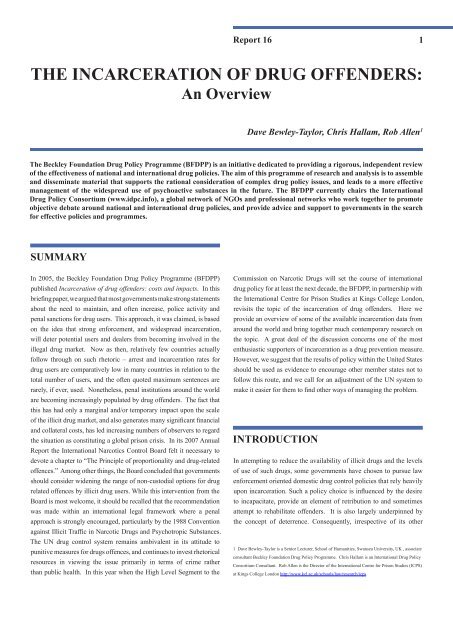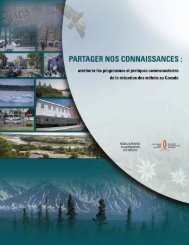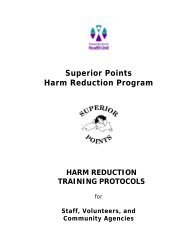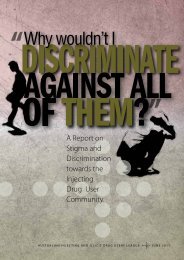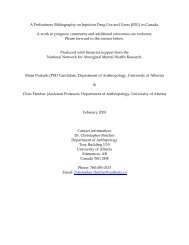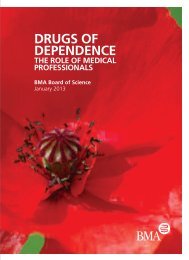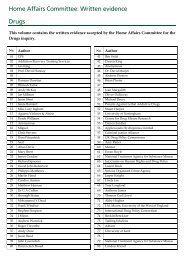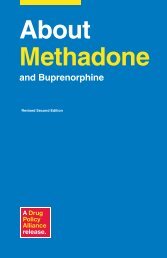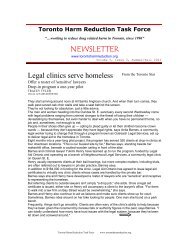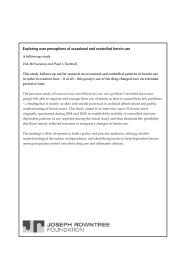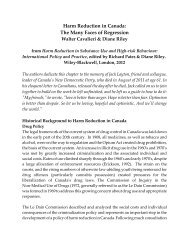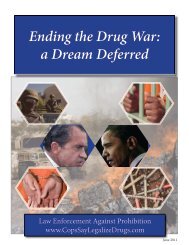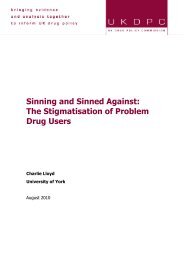The Incarceration of Drug Offenders - The Beckley Foundation
The Incarceration of Drug Offenders - The Beckley Foundation
The Incarceration of Drug Offenders - The Beckley Foundation
- No tags were found...
You also want an ePaper? Increase the reach of your titles
YUMPU automatically turns print PDFs into web optimized ePapers that Google loves.
Report 161THE INCARCERATION OF DRUG OFFENDERS:An OverviewDave Bewley-Taylor, Chris Hallam, Rob Allen 1<strong>The</strong> <strong>Beckley</strong> <strong>Foundation</strong> <strong>Drug</strong> Policy Programme (BFDPP) is an initiative dedicated to providing a rigorous, independent review<strong>of</strong> the effectiveness <strong>of</strong> national and international drug policies. <strong>The</strong> aim <strong>of</strong> this programme <strong>of</strong> research and analysis is to assembleand disseminate material that supports the rational consideration <strong>of</strong> complex drug policy issues, and leads to a more effectivemanagement <strong>of</strong> the widespread use <strong>of</strong> psychoactive substances in the future. <strong>The</strong> BFDPP currently chairs the International<strong>Drug</strong> Policy Consortium (www.idpc.info), a global network <strong>of</strong> NGOs and pr<strong>of</strong>essional networks who work together to promoteobjective debate around national and international drug policies, and provide advice and support to governments in the searchfor effective policies and programmes.SUMMARYIn 2005, the <strong>Beckley</strong> <strong>Foundation</strong> <strong>Drug</strong> Policy Programme (BFDPP)published <strong>Incarceration</strong> <strong>of</strong> drug <strong>of</strong>fenders: costs and impacts. In thisbriefing paper, we argued that most governments make strong statementsabout the need to maintain, and <strong>of</strong>ten increase, police activity andpenal sanctions for drug users. This approach, it was claimed, is basedon the idea that strong enforcement, and widespread incarceration,will deter potential users and dealers from becoming involved in theillegal drug market. Now as then, relatively few countries actuallyfollow through on such rhetoric – arrest and incarceration rates fordrug users are comparatively low in many countries in relation to thetotal number <strong>of</strong> users, and the <strong>of</strong>ten quoted maximum sentences arerarely, if ever, used. Nonetheless, penal institutions around the worldare becoming increasingly populated by drug <strong>of</strong>fenders. <strong>The</strong> fact thatthis has had only a marginal and/or temporary impact upon the scale<strong>of</strong> the illicit drug market, and also generates many significant financialand collateral costs, has led increasing numbers <strong>of</strong> observers to regardthe situation as constituting a global prison crisis. In its 2007 AnnualReport the International Narcotics Control Board felt it necessary todevote a chapter to “<strong>The</strong> Principle <strong>of</strong> proportionality and drug-related<strong>of</strong>fences.” Among other things, the Board concluded that governmentsshould consider widening the range <strong>of</strong> non-custodial options for drugrelated <strong>of</strong>fences by illicit drug users. While this intervention from theBoard is most welcome, it should be recalled that the recommendationwas made within an international legal framework where a penalapproach is strongly encouraged, particularly by the 1988 Conventionagainst Illicit Traffic in Narcotic <strong>Drug</strong>s and Psychotropic Substances.<strong>The</strong> UN drug control system remains ambivalent in its attitude topunitive measures for drugs <strong>of</strong>fences, and continues to invest rhetoricalresources in viewing the issue primarily in terms <strong>of</strong> crime ratherthan public health. In this year when the High Level Segment to theCommission on Narcotic <strong>Drug</strong>s will set the course <strong>of</strong> internationaldrug policy for at least the next decade, the BFDPP, in partnership withthe International Centre for Prison Studies at Kings College London,revisits the topic <strong>of</strong> the incarceration <strong>of</strong> drug <strong>of</strong>fenders. Here weprovide an overview <strong>of</strong> some <strong>of</strong> the available incarceration data fromaround the world and bring together much contemporary research onthe topic. A great deal <strong>of</strong> the discussion concerns one <strong>of</strong> the mostenthusiastic supporters <strong>of</strong> incarceration as a drug prevention measure.However, we suggest that the results <strong>of</strong> policy within the United Statesshould be used as evidence to encourage other member states not t<strong>of</strong>ollow this route, and we call for an adjustment <strong>of</strong> the UN system tomake it easier for them to find other ways <strong>of</strong> managing the problem.INTRODUCTIONIn attempting to reduce the availability <strong>of</strong> illicit drugs and the levels<strong>of</strong> use <strong>of</strong> such drugs, some governments have chosen to pursue lawenforcement oriented domestic drug control policies that rely heavilyupon incarceration. Such a policy choice is influenced by the desireto incapacitate, provide an element <strong>of</strong> retribution to and sometimesattempt to rehabilitate <strong>of</strong>fenders. It is also largely underpinned bythe concept <strong>of</strong> deterrence. Consequently, irrespective <strong>of</strong> its other1 Dave Bewley-Taylor is a Senior Lecturer, School <strong>of</strong> Humanities, Swansea University, UK , associateconsultant <strong>Beckley</strong> <strong>Foundation</strong> <strong>Drug</strong> Policy Programme. Chris Hallam is an International <strong>Drug</strong> PolicyConsortium Consultant. Rob Allen is the Director <strong>of</strong> the International Centre for Prison Studies (ICPS)at Kings College London http://www.kcl.ac.uk/schools/law/research/icps


